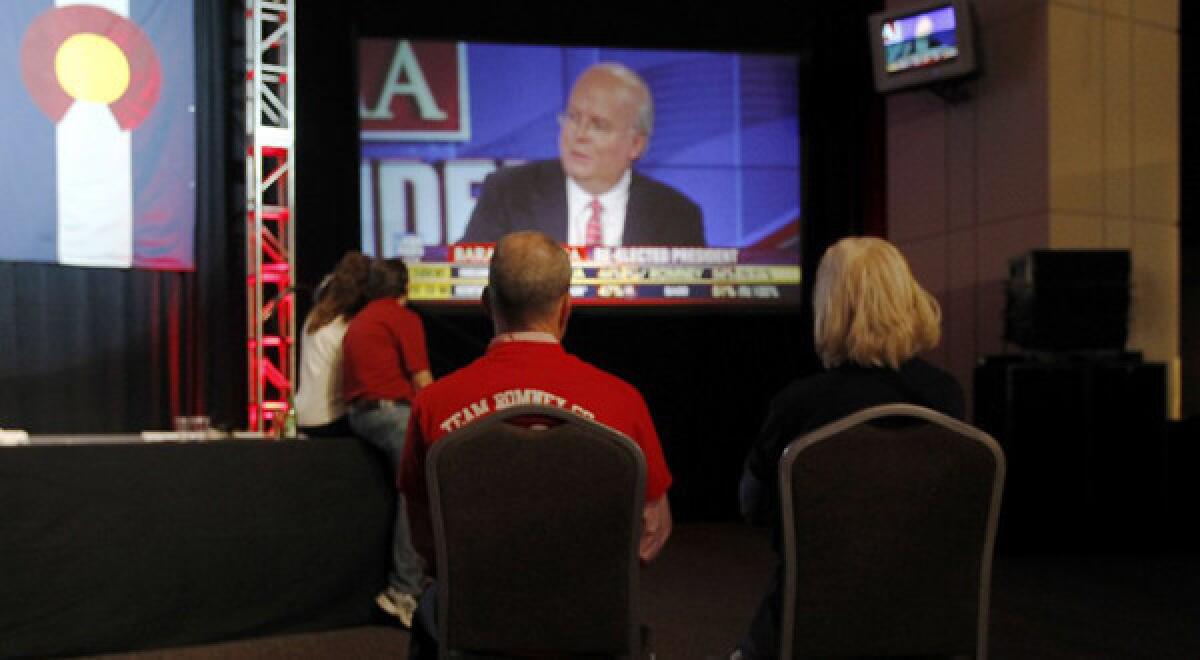An Obama mandate? The pundits don’t agree, with themselves

Funny thing about declaring a “mandate” after a presidential election. Pundits tend to think that when their guy wins he has a mandate — meaning he can impose his policies on Congress, because the American people want it that way. When the other guy wins, the triumph has no lasting punch.
A bunch of pundits renewed a quadrennial tradition that might be called Mandate Derangement Syndrome.
Weekly Standard editor and frequent Fox News contributor Fred Barnes played the game this week. He brushed aside President Obama’s 2-percentage-point, 3-million-vote (and counting, with many votes in Democratic-friendly California still to be counted) victory over Republican Mitt Romney as hollow. Obama, Barnes said, is a “man with no plan and no mandate.”
Funny, because he felt quite differently when President George W. Bush won reelection in 2004. The same Barnes declared the Republican’s win a “3-point landslide,” adding: “I think he’s got a mandate. And what is a mandate? A mandate is just that you won by talking about certain issues, and you will pursue them afterward.”
Barnes’ pal from Fox’s nightly “Special Report,” Charles Krauthammer, faces a small consistency gap, too.
In 2004, he noted that Bush had gotten to 50% of the vote, “unusual in our time.... And [when] you expand your representation in the House and the Senate, in an election where the president ran on the record and on the stuff he says he’s going to do in the future, you’ve got a mandate.”
Flash to 2012, conservative stalwart Krauthammer considered the Obama win as slightly less meaningful. Though the president also secured more than half the popular vote and saw his party gain seats in both the House and Senate, the syndicated columnist scowled. Krauthammer, on Fox News: “He’s got no mandate.”
Not surprisingly, GOP strategist Karl Rove claimed a mandate for his boss, President Bush, after the 2004 victory over Democrat John F. Kerry. Like Krauthammer, he stressed the 50% threshold and GOP gains in both houses of Congress.
“This is the first president since Franklin Roosevelt to win reelection while adding to his party’s numbers in the House and Senate,” Rove boasted back in ’04. “The country is still close, but it has moved in a Republican direction and this election confirmed that.”
In 2012, Rove chooses different indicators when considering whether Obama has a mandate. Instead of popular votes and congressional gains, he said the operative factor this time around is the total number of votes cast and the tone of the campaign. Because fewer people voted in 2012 than in 2008 and Obama’s campaign was guilty of “unprecedented … negativity and ugliness,” he wins no authority on the issues in his second term, Rove claimed in a Wall Street Journal column.
(This, of course, from the man whose candidate benefited immensely by the scurrilous “Swift Boat” attacks on Bush opponent John Kerry, who served honorably in Vietnam, but was made to look like a war criminal because he came home and protested U.S. policy in Southeast Asia.)
“While victorious, the president is hardly a colossus,” Rove argued in his postmortem, which followed his vain attempt a night earlier to prevent Fox News from calling the election too quickly for Obama. “He ran a campaign utterly devoid of a governing vision because he offered little in the way of a prospective agenda.”
That is the emerging anti-Obama consensus: That he won without making specific policy proposals and therefore has no power to make demands, in particular, of a House of Representatives still dominated by Republicans.
Truth told, Obama’s campaign did not bristle with new ideas. But it was not devoid of specifics, either. Key among them was the notion that the wealthiest Americans should pay more in taxes. Exit polls showed that 60% of Americans agreed with him. That will be the basis for Obama demanding GOP movement on the tax issue.
Obama also said he wanted to restart negotiations to approve comprehensive immigration reform and — given the flogging they took from Latino voters — even some conservatives have been signaling they might be ready to revisit the issue in 2013.
It would be unfair to suggest that only conservative commentators suffer from Mandate Derangement Syndrome. Plenty of liberals insisted President Bush had no mandate in 2004, but at least one has leaped to declare the deep meaning of Obama’s 2012 victory.
Commentator E.J. Dionne insisted in 2004 that Bush had not prevailed on the issues but (sounding remarkably like the Rove of 2012) had triumphed because of “attacks, the use of gay marriage as a issue to mobilize evangelical voters.” Dionne added: “I think that risks exactly what will lead to the greatest risk for this president, which is hubris.”
In 2012 the Obama victory struck Dionne as giving the president “the strongest argument a politician can offer. Repeatedly, he asked the voters to settle Washington’s squabbles in his favor. On Tuesday, they did.” He said Obama’s victory this time around even outstrips his 2008 breakthrough.”
“A president who took office four years ago on a wave of emotion,” Dionne wrote, “may now have behind him something more valuable and durable: a majority that thought hard about his stewardship and decided to let him finish the job he had begun.”
Clearly, mandates are in the eye of the beholder. And consistency remains the hobgoblin of, just who?
Follow Politics Now on Twitter and Facebook
Twitter: latimesrainey
Times staff writer Robin Abcarian contributed to this report.
More to Read
Get the L.A. Times Politics newsletter
Deeply reported insights into legislation, politics and policy from Sacramento, Washington and beyond. In your inbox three times per week.
You may occasionally receive promotional content from the Los Angeles Times.











